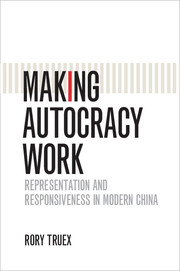Book contents
4 - Testing Representation
Published online by Cambridge University Press: 13 October 2016
Summary
Hongyu Online
NPC deputy Zhou Hongyu counts his constituent emails daily. Zhou's personal website – www.hongyu-online.com – was the first of its kind, providing detailed information on his legislative activities. Constituents can read the full text of Zhou's latest opinions and motions, brush up on the details of his personal story, and even contact him with their own ideas. “The Website is receiving an increasing amount of mail from netizens, especially during the annual session of the National People's Congress,” he explains. “This morning when I logged on it, I received 18 mails. At noon, I had another dozen. Just now, I received four more. And it's not over yet” (“NPC Deputy Zhou Hongyu” 2007).
Zhou's website, combined with his passion for the job, has made him something of a super-legislator. In his first two terms in office (2003– 12), Zhou singlehandedly proposed 212 different opinions and motions, addressing issues ranging from the antiquated petition system to rampant employment discrimination. He frequently turns constituent emails into formal proposals, but his personal pet issue is education reform. In 2003, Zhou's first year as a deputy, he put forward a suggestion for instituting free compulsory education in rural areas, but his proposal was later denied by the Ministry of Finance on the grounds of financial unfeasibility. Zhou redoubled his efforts, working with other experts to calculate the cost of the free education program (“Prof a Student” 2011).He raised the proposal again in 2004, this time including a more complete sustainability calculation, and reportedly slipped it into Premier Wen Jiabao's hands during a brief exchange (“NPC Deputy Zhou Hongyu”2007). Two years later, Zhou's opinion became reality in the 2006 Amendment to the Compulsory Education Law, which guaranteed nine years of free compulsory education for children in the countryside.
This diligence has earned Zhou a reputation as one of China's top legislators, and he has quickly risen up the People's Congress hierarchy. He was recently reselected to serve his third NPC term, and he now concurrently serves as deputy director of the Hubei Provincial People's Congress Standing Committee. The state media frequently celebrate his accomplishments with lengthy interviews. Some have fondly labeled him “cannon mouth Zhou” or “the crowing rooster” because he loudly alerts the government to citizen demands.
Information
- Type
- Chapter
- Information
- Making Autocracy WorkRepresentation and Responsiveness in Modern China, pp. 75 - 102Publisher: Cambridge University PressPrint publication year: 2016
